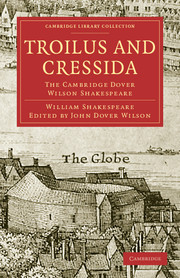THE STAGE HISTORY
Published online by Cambridge University Press: 07 September 2010
Summary
This play, with its difficult problems for both scholars and theatrical producers, has probably been less seen by the general public than most others in the canon. Hardly staged at all till the present century, revivals up to date have been largely either in universities, or by special groups and companies.
The earliest mention of Shakespeare's Troilus and Cressida occurs in the entry of a play with this title in the Stationers' Register, on 7 February 1603; another was made on 28 January 1609. The first entry was probably a ‘blocking’ one; the second was followed the same year by the publication of a quarto, described as ‘a new play’ in the preface. No records of performances have been found; but some possible allusions to the play occur in the earliest years. One, of 1603, seems fairly certain, as it combines its subject with those of Richard III and Lucrece:
Of Helens rape and Troyes beseiged Towne,
Of Troylus faith, and Cressids falsitie,
Of Rychards stratagems for the English crowne,
Of Tarquins lust, and Lucrece chastitie,
Of these, of none of these my muse nowe treates.
If these lines do refer to the play, it must have been staged soon after its first entry in S.R.
After the Restoration the play was never seen in the English theatre till the present century—though John Philip Kemble made, but never produced, an acting version with a tentative cast which is now in the Folger Library, Washington.
- Type
- Chapter
- Information
- Troilus and CressidaThe Cambridge Dover Wilson Shakespeare, pp. xlvii - lviPublisher: Cambridge University PressPrint publication year: 2009First published in: 1957



